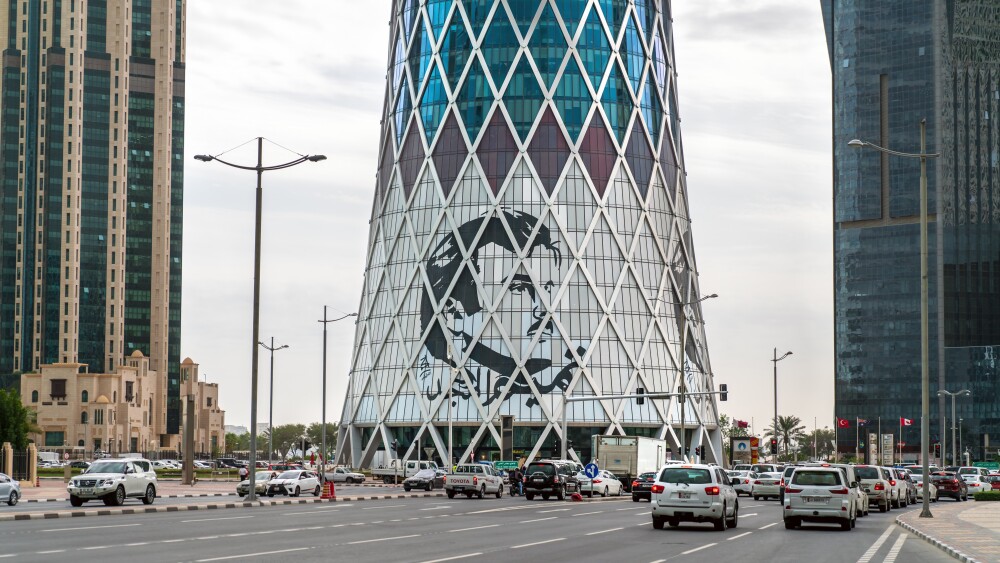After nearly two years of frustration about Hamas foot-dragging and the terror group’s refusal to release the Jewish hostages it cages and starves in underground tunnels, the Israeli Air Force struck Hamas targets in Doha, striking not only Doha-based Hamas leaders but also some from Turkey who reportedly had flown in that morning for discussions. U.S. officials quietly say Israel informed the White House in advance of its strikes. Qatar either declined or otherwise failed to fire its U.S.-provided defense.
While Qatar and its Arab allies express outrage, the crisis provides Qatar an offramp it should embrace. Frustration with Qatar has mounted significantly in recent years as many in the United States, Israel, and Qatar’s Arab neighbors complain about the tiny Persian Gulf state’s efforts to promote Islamist groups that incite, if not directly perpetrate, terrorism.
It is true that Qatar mediates between the United States and Israel ... but Doha has never been a neutral negotiator.
Qatari officials regularly show critics letters and documents from the White House and State Department dating back to the George W. Bush administration that thank Qatar for its partnership and mediation. It is true that Qatar mediates between the United States and Israel, on one hand, and groups with which Washington and Jerusalem have no direct relations, but Doha has never been a neutral negotiator. Senior Qatari officials have always wanted Islamist ideologues to win and liberal democracies to lose. When the Taliban defeated the United States in Afghanistan—there is no other way to spin President Joe Biden’s unilateral withdrawal under fire, even if it was a defeat of the White House’s own choice—Qatari ideologues celebrated a mission accomplished. Qatar’s mediation is meant less to resolve conflict and more to win immunity and escape accountability for action. Qatar’s behavior is analogous to a drug cartel that provides information about drug dealing on a single street corner while simultaneously flooding the country with contraband.
Qatar has not always been such a malign actor on the world stage, however, nor is it homogenous. Qatari Emir Sheikh Tamim bin Hamad Al Thani has ruled the country for twelve years; the rial stops with him. He has absolute control over every policy. Much of the destabilizing policies in which Qatar now engages date to his rule. His mother, Moza bint Nasser Al-Missned, the head of the Qatar Foundation and one of the three consorts of former Emir Hamad bin Khalifa Al Thani, sets in practice the ideology and provides the resources. As one of the most artificial countries in the Middle East and one that, unlike Bahrain, cannot trace its identity or legacy back to ancient times, Sheikh Tamim and Sheikha Moza have sought to use a radical exegesis of Islam to make Qatar’s mark on the world stage. Qatar is also one of two states that embrace the Wahabi approach as their official religious practice. Unlike Saudi Arabia, however, Qatar cannot claim to be the birthplace of Muhammad ibn Abd al-Wahhab (1703-1792), nor is it the custodian of the two holy mosques. Being more supportive of extremist causes than the Saudis gives Qatar a perverted sense of legitimacy.
Qatar’s strategy of state capture of the United States, buying influence and co-opting politicians, universities, journalists, and businesses, will no more work for it than it did for the People’s Republic of China a decade ago. Many American officials are corrupt and can be compromised, but the entire system is more resilient.
No longer can [Qatar] have it both ways, buying broad immunity while sponsoring extremism absent accountability.
Now, however, Qatar is about to cross the Rubicon. No longer can it have it both ways, buying broad immunity while sponsoring extremism absent accountability. Israel’s strike on September 9, 2025, may have been limited, but it shreds a red line. What makes headlines today can be relegated to the back pages of a paper should it happen repeatedly. That was the case with violent attacks in Syria and Iraq, for example. If Qatar wants to make itself the epicenter of conflict and an engine for the spread of its ideology, it cannot hold itself immune from consequences. Every country that has promoted jihadism for export only—Pakistan, Saudi Arabia, Syria, Turkey—has experienced blowback within its borders.
If Qatar doubles down on its support for groups like the Taliban, Islah, and Hamas, it increasingly will find itself mired in conflict. Its investments will pay dividends in blood, not only externally but internally as well. Its ambitions to host the Olympics as a capstone after successfully hosting the FIFA World Cup and the Qatar Formula 1 Grand Prix will fall short. Iran’s missile attack on Al-Udeid Air Base may have been more pantomime than real, and Israel’s airstrike may have been quietly telegraphed in advance. Both may be swept under the rug, but a third attack will hobble Qatar’s image and economy. Doha will be more Damascus and less Dubai.
Sheikh Tamim now has a decision that will define his legacy. He must choose between his mother and his country. If he continues to suck on his mother’s ideological teat, he will bring nothing but ruin to his country and will end with Qatar’s designation as a state sponsor of terrorism. If he resets Qatar’s foreign policy to promote moderation over extremism, however, and pursues the policies may of his underlings prefer to embrace, Qatar could be a real force for stability in the region.








